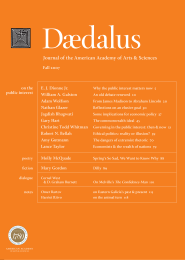Governing in the public interest: then & now
“Good policy is good politics” was one of Webster Todd’s favorite political aphorisms. Twice chairman of the New Jersey State Republican Party, a behind-the-scenes party leader who was one of those who traveled to Paris to persuade Dwight Eisenhower to come home from Europe and run for president as a Republican, and a delegate to numerous Republican National Conventions, Web Todd was what would have been called back in the 1940s, 1950s, and 1960s a member in good standing of the Eastern Republican establishment. He was also my father.
Underlying his belief that good policy was good politics was his conviction that government, and those who sought to lead it, had a responsibility to act always in the public interest, to serve the needs of the people, from whom government derives its legitimacy.
During most of my time observing and participating in political life (I am somewhat abashed to admit that it has been more than fifty years since I attended my first Republican National Convention–and I have not missed one since), most of the politicians I have known and worked with had a fairly clear idea of what was meant by ‘the public interest.’ Without getting into a discussion of John Stuart Mill and the philosophy of utilitarianism, I believe they viewed serving the public interest as doing the greatest good for the greatest number of people. It also meant protecting personal liberty, encouraging individual initiative and opportunity, and safeguarding the fundamental rights that every member of a free society possesses.
Contemporary political history (which I define as the political history I can remember) is filled with examples of Washington putting the public interest above partisan ones. Perhaps the most notable example is the passage of the landmark civil-rights bills in the mid-1960s: the Civil Rights Act of 1964 and the Voting Rights Act of 1965. The enactment of these measures required that Republicans and Democrats work together to end the insidiously persistent institutional instruments of racism in America. . . .
